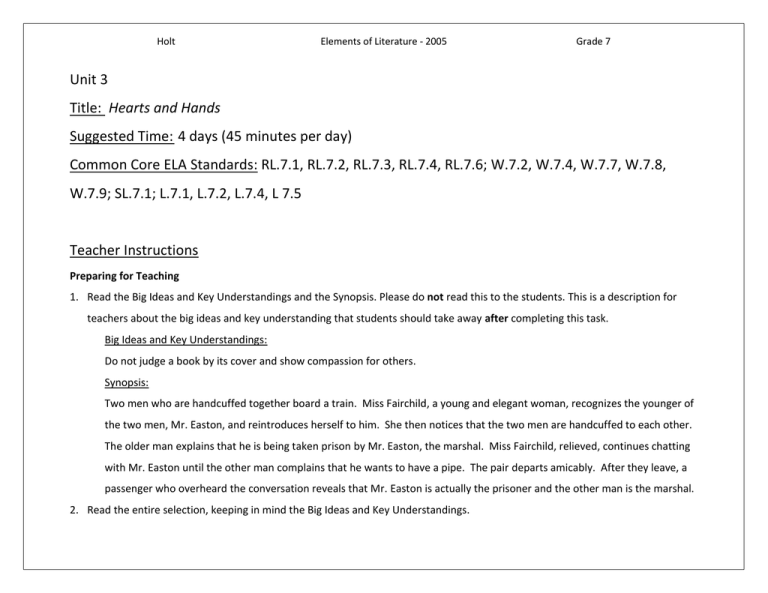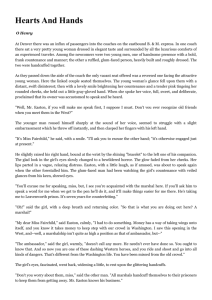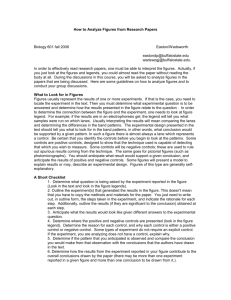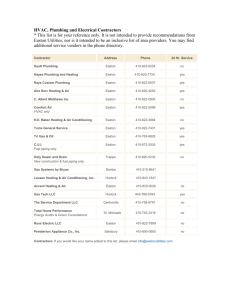Hearts and Hands - Achieve the Core
advertisement

Holt Elements of Literature - 2005 Grade 7 Unit 3 Title: Hearts and Hands Suggested Time: 4 days (45 minutes per day) Common Core ELA Standards: RL.7.1, RL.7.2, RL.7.3, RL.7.4, RL.7.6; W.7.2, W.7.4, W.7.7, W.7.8, W.7.9; SL.7.1; L.7.1, L.7.2, L.7.4, L 7.5 Teacher Instructions Preparing for Teaching 1. Read the Big Ideas and Key Understandings and the Synopsis. Please do not read this to the students. This is a description for teachers about the big ideas and key understanding that students should take away after completing this task. Big Ideas and Key Understandings: Do not judge a book by its cover and show compassion for others. Synopsis: Two men who are handcuffed together board a train. Miss Fairchild, a young and elegant woman, recognizes the younger of the two men, Mr. Easton, and reintroduces herself to him. She then notices that the two men are handcuffed to each other. The older man explains that he is being taken prison by Mr. Easton, the marshal. Miss Fairchild, relieved, continues chatting with Mr. Easton until the other man complains that he wants to have a pipe. The pair departs amicably. After they leave, a passenger who overheard the conversation reveals that Mr. Easton is actually the prisoner and the other man is the marshal. 2. Read the entire selection, keeping in mind the Big Ideas and Key Understandings. Holt Elements of Literature - 2005 Grade 7 3. Re-read the text while noting the stopping points for the Text Dependent Questions and teaching Tier II/academic vocabulary. During Teaching 1. Students read the entire selection independently. 2. Teacher reads the text aloud while students follow along or students take turns reading aloud to each other. Depending on the text length and student need, the teacher may choose to read the full text or a passage aloud. For a particularly complex text, the teacher may choose to reverse the order of steps 1 and 2. 3. Students and teacher re-read the text while stopping to respond to and discuss the questions, continually returning to the text. A variety of methods can be used to structure the reading and discussion (i.e., whole class discussion, think-pair-share, independent written response, group work, etc.) Text Dependent Questions Text-dependent Questions Describe the three main characters. (p. 239) Using textual evidence from page 239-240, why is Mr. Easton embarrassed? Look at the following description from page 240 of Miss Evidence-based Answers Miss Fairchild is an attractive young woman with a lovely smile who is “accustomed to speak and being heard” and is an experienced traveler. (239) “Mr. Easton is a young man with a handsome presence and a bold, frank countenance and manner” (240). The other man is “a ruffled, glum-faced person, heavily built and roughly dressed” (239). Mr. Easton is embarrassed because he cannot shake Miss Fairchild’s hand because he is handcuffed to the other man. “Among the new comers were two young men….The two were handcuffed together” (239). “I’ll ask you to excuse the other hand; it’s otherwise engaged just at present” (240). Miss Fairchild is reacting to “he slightly raised his right hand, Holt Elements of Literature - 2005 Fairchild: “The glad look in the girl’s eyes changed to a bewildered horror. The glow faded from her cheeks. Her lips parted in a vague, relaxing distress.” What is she reacting to and why she might she have this reaction? Use textual evidence to support your answer. “’Oh!’ said the girl, with a deep breath and returning color.’” What information about Mr. Easton is Miss Fairchild reacting to in the above quote from page 240? On page 240, Mr. Easton states that, “Money has a way of taking wings unto itself, and you know it takes money to keep step with our crowd in Washington” (page 240). What does Mr. Easton mean by the idiom, “taking wings unto itself,” and what does this tell us about both Mr. Easton and Miss Fairchild’s former lives in Washington? What can the reader infer about Miss Fairchild’s intentions by her actions on the bottom on page 240 to the middle of page 241? On page 241, Mr. Easton says, “My butterfly days are over, I fear.” Give three similarities between Mr. Easton and a butterfly. Grade 7 bound at the wrist by the shiny ‘bracelet’ to the left one of his companion” (240). She is surprised to see her old friend handcuffed. Miss Fairchild is reacting to the fact that she believes Mr. Easton is a marshal instead of a criminal. She shows this by her “deep breath” and “returning color,” which conveys her relief in the situation (240). Mr. Easton is referring to the idea that money goes too quickly and their lives in Washington were expensive. This can also be connected to the other man’s comment that, “It’s seven years for counterfeiting” because the life in Washington could have led someone to counterfeit to have enough money to fit in (240). Miss Fairchild is flirting with Mr. Easton and wants him to know that she liked him in Washington more than she liked the ambassador, and she is hinting that she is interested in living in the West where he is. Miss Fairchild says, “’The ambassador,’ said the girl, warmly, ‘doesn’t call anymore. He needn’t ever have done so. You ought to know that…’ and “’I love the West,’ said the girl irrelevantly. Her eyes were shining softly” (240241). (Students answers may vary.) Mr. Easton is now a marshal, he has gone from living on the East coast to living in the West, and he has a possibility of a relationship with Miss Fairchild. This is similar to a butterfly because of the metamorphosis a caterpillar goes through to become a butterfly, the migration butterflies take on, and how they search for other butterflies. Mr. Easton could also mean that he is not as fancy anymore Holt Elements of Literature - 2005 On page 242, what does the author reveal in the last paragraph of the text? What clues does the author provide the reader throughout the text regarding the true nature of the marshal? (pgs. 239-242) What does the marshal show about his character by choosing to lie for Mr. Easton, and how does this tie into the overall theme of “Hearts and Hands?” (pgs. 239-242) Grade 7 since moving to the west where things are less refined. He is also has to wear handcuffs instead of being “free to fly” so to speak (241). The text states, “why—Oh! [d]idn’t you catch on? Say—did you ever know an officer to handcuff a prisoner to his right hand?” Since a marshal would never have handcuffed a prisoner to his right hand because he would need to use it, therefore, we know that the “glum-faced man” is actually the marshal instead of Mr. Easton (242). See the Note to Teacher section about the manners of the time. “The glum-faced man had been watching the girl’s countenance with veiled glances from his keen, shrewd eyes” (240) can be used to show that he is evaluating the situation as a marshal would. “’Say Mr. Marshal,’ growled the glum-faced man. ‘This isn’t quite fair. Haven’t had a smoke all day. Haven’t you talked long enough? Take me in the smoker now, won’t you? I’m half dead for a pipe’” (241) shows how the glum-faced man is the one in control. The marshal’s willingness to play along with the lie of Mr. Easton shows that he is understanding and compassionate to people in need. This makes readers see that we should have compassion for others, which is the overall theme of the text. Holt Elements of Literature - 2005 Grade 7 Meaning needs to be provided Meaning can be learned from context Tier II/Academic Vocabulary These words require less time to learn These words require more time to learn (They are concrete or describe an object/event/ process/characteristic that is familiar to students) (They are abstract, have multiple meanings, are a part of a word family, or are likely to appear again in future texts) Page 239 – tingeing Page 239 – proclaimed Page 240 – roused Page 240 – bewildered Page 240 – dashing Page 241 – gloss Page 242 – sidled Page 239 – elegant Page 239 – comforts Page 240 – petition Page 239 – accustomed Page 239 – countenance Page 239 – glum-faced Page 240 – keen Page 240 – shrewd Page 240 – counterfeiting Page 240 – ambassador Page 239 – influx Page 239 – presence Page 240 – vague Page 240 – marshalship Holt Elements of Literature - 2005 Grade 7 Culminating Writing Task Prompt o Look at the title “Hearts and Hands.” Write a three paragraph expository essay analyzing how this title relates to the story’s theme. Support your thesis with relevant and sufficient evidence from the text, including direct quotes and page numbers. 1. Students identify their writing task from the prompt provided. 2. Students complete an evidence chart as a pre-writing activity. Teachers should remind students to use any relevant notes they compiled while reading and answering the text-dependent questions. Evidence Quote or paraphrase The other man is “a ruffled, glum-faced person, heavily built and roughly dressed.” Page number 239 “I’ll ask you to excuse the other hand; it’s otherwise engaged just at present.” 240 “he slightly raised his right hand, bound at the wrist by the shiny ‘bracelet’ to the left one of his companion.” 240 “You’ll excuse me for speaking, miss, but I see you’re acquainted with the marshal here” 240 “’Oh!’ said the girl, with a deep breath and returning color.’” 240 Elaboration / explanation of how this evidence supports ideas or argument This quote is showing the visible appearance of the marshal is one that is misleading and one that might get judged a lot. Mr. Easton is embarrassed because he cannot shake Miss Fairchild’s hand because he is handcuffed to the other man. Mr. Easton shows that he is handcuffed to the other man’s left hand and the manners of the day dictated that this wouldn’t have happened. This quote is showing that the Marshal is lying for Mr. Easton. He is showing his compassion by lying to stop Miss Fairchild from judging her old friend and spare Mr. Easton that embarrassment. This quote shows readers why the marshal would have lied to help Mr. Easton in this situation. It also shows that Miss Fairchild would be the type to Holt Elements of Literature - 2005 “why—Oh! [d]idn’t you catch on? Say—did you ever know an officer to handcuff a prisoner to his right hand?” 242 Grade 7 judge a prisoner. This quote shows the surprise ending where readers realize the compassion the marshal had in lying for Mr. Easton. 3. Once students have completed the evidence chart, they should look back at the writing prompt in order to remind themselves what kind of response they are writing (i.e. expository, analytical, argumentative) and think about the evidence they found. (Depending on the grade level, teachers may want to review students’ evidence charts in some way to ensure accuracy.) From here, students should develop a specific thesis statement. This could be done independently, with a partner, small group, or the entire class. Consider directing students to the following sites to learn more about thesis statements: http://owl.english.purdue.edu/owl/resource/545/01/ OR http://www.indiana.edu/~wts/pamphlets/ thesis_statement.shtml. 4. Students compose a rough draft. With regard to grade level and student ability, teachers should decide how much scaffolding they will provide during this process (i.e. modeling, showing example pieces, sharing work as students go). 5. Students complete final draft. Sample Answer The title “Hearts and Hands” is directly related to the theme of showing compassion and not judging people in a few key ways. To begin, the story starts with two people, Mr. Easton and the marshal, handcuffed together. It is this handcuffing that lends to the “Hands” part of the title. The entire story is based on the premise that there are two men held together by their hands. However, it is the “Heart” part of the title that explains the theme. After Mr. Easton and the marshal are brought on the train, we are introduced to Miss Fairchild, who is quite beautiful and an old acquaintance of Mr. Easton. After Miss Fairchild speaks to the pair, Mr. Easton is immediately embarrassed Holt Elements of Literature - 2005 Grade 7 because he is handcuffed and cannot shake her hand. “I’ll ask you to excuse the other hand; it’s otherwise engaged just at present” (240). Sensing his shame at having the “shiny ‘bracelet,’” the marshal shows compassion by suggesting he is the prisoner and Mr. Easton is the marshal (240). “You’ll excuse me for speaking, miss, but I see you’re acquainted with the marshal here” (240). The marshal realized how painful it would be for Mr. Easton to admit he was the prisoner, so he lied for him. This lie shows the heart of the story, which reveals both the theme and the reason for the title. The effect of the lie is immediate in the response of Miss. Fairchild. She shows obvious relief that Mr. Easton is not the prisoner. “’Oh!’ said the girl, with a deep breath and returning color’” (240). It is in this response that reveals the true saving grace that the marshal just offered Mr. Easton. Without the lie, Miss. Fairchild would have been shocked and horrified. The marshal offered a lie about his handcuffs to prove he has compassion (or heart) for the prisoner. So, therefore, the author has perfectly titled the piece “Hearts and Hands” because by having the marshal lie about his hand being that of the prisoner, he is also showing his heart for Mr. Easton and the theme of compassion. Additional Task(s) Research the typical Western hero to understand Miss Fairchild’s excitement at living in the West with Mr. Easton. Take notes during your research and provide evidence from your sources in a final informative paragraph, using proper citation. o Answers will vary. Students should discover that back in the Wild West “heroes” were brave men who fought for their lives on a daily basis. Some possible men to research could be Buffalo Bill, Billy the Kid, Johnny Ringo, Jesse James, etc. Holt Elements of Literature - 2005 Grade 7 Note to Teacher You might want to discuss proper etiquette and manners during this time period, so the students realize that it is expected to shake with the right hand, which will connect with question #2 and the surprise ending of the story.



